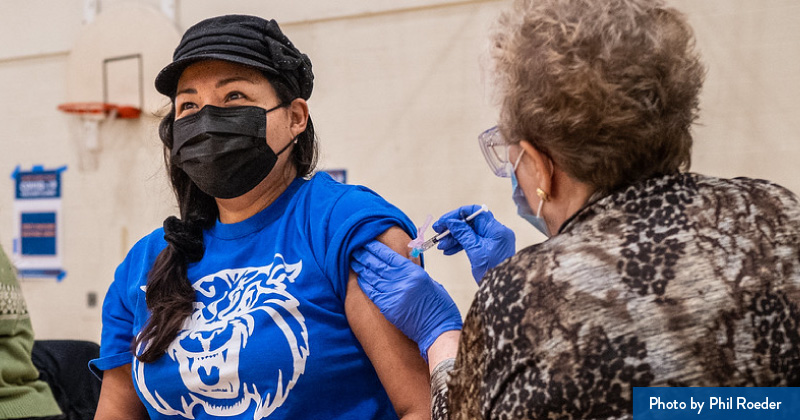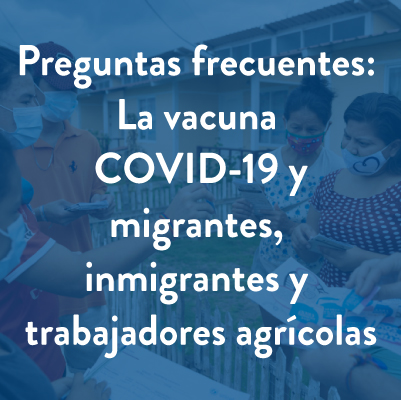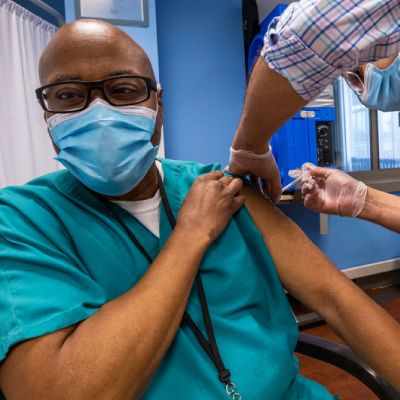- Who We Are
- Clinician Employment
- Publications
- Witness to Witness (W2W)
- El Premio Kugel & Zuroweste a la Justicia en la Salud
- Your Voice Matters: Photovoice Project
Health Department and Vaccine Clinic Considerations to Reach Migrant and Immigrant Workers: A COVID-19 Vaccine Accessibility Checklist
Thu, 02/18/2021 | by MCN Administration


As hope remains that the availability of vaccines will grow, health departments and vaccine clinics must prepare to better serve hard-to-reach populations such as persons in the refugee, immigrant, and migrant (RIM) communities, a large proportion of which have been deemed essential workers throughout the pandemic. Challenges, including language, transportation, fear of due to immigration status and other barriers, and solutions, are outlined in MCN’s new vaccine accessibility checklist, which is available in both English and Spanish.
As MCN’s engagement with the COVID-19 Vulnerable Populations Task Force in Salisbury, Maryland, and health departments and clinicians across the country, and in Puerto Rico, continues, MCN can see these barriers to vaccine access identified and investigated daily. These observations have inspired MCN to share the lesser-known best practices for vaccine accessibility to RIM communities through our new vaccine checklist, created by MCN in partnership with The National Resource Center for Refugees, Immigrants, and Migrants (NRC-RIM).
While many health department and vaccine clinic systems for vaccine distribution are built for the general public, they often miss vital elements that make vaccines easily accessible to RIM communities. The federal government is committed to ensure that safe, effective, cost-free vaccines are available to the entire US public, regardless of their immigration status, however, RIM communities are still finding it more difficult to access vaccines than the general public, and vaccine dissemination sites may unknowingly be erecting unnecessary barriers.
In addition to those barriers already mentioned, RIM communities often struggle with restricted mobility, geographic isolation, limited digital access (preventing online sign-up for vaccine appointments), low levels of literacy and formal education, limited English proficiency, lack of transportation, and fear spurring from immigration status and job loss that is antagonized by excessive requests for personal information and documentation. These barriers are in addition to the regular hesitancy for the COVID-19 vaccine that some of the general US public has, as well as additional fears due to the negative history of vaccines and communities of color in the US. In light of these significant and overlapping barriers, many vaccine dissemination sites are inadequately prepared to assist RIM community members with accessing vaccines.
While many health department and vaccine clinic systems for vaccine distribution are built for the general public, they often miss vital elements that make vaccines easily accessible to RIM communities. The federal government is committed to ensure that safe, effective, cost-free vaccines are available to the entire US public, regardless of their immigration status, however, RIM communities are still finding it more difficult to access vaccines than the general public, and vaccine dissemination sites may unknowingly be erecting unnecessary barriers. In addition to those barriers already mentioned, RIM communities often struggle with restricted mobility, geographic isolation, limited digital access (preventing online sign-up for vaccine appointments), low levels of literacy and formal education, limited English proficiency, lack of transportation, and fear spurring from immigration status and job loss that is antagonized by excessive requests for personal information and documentation. These barriers are in addition to the regular hesitancy for the COVID-19 vaccine that some of the general US public has, as well as additional fears due to the negative history of vaccines and communities of color in the US. In light of these significant and overlapping barriers, many vaccine dissemination sites are inadequately prepared to assist RIM community members with accessing vaccines.
The vaccine accessibility checklist provides best practices for reaching RIM communities for COVID-19 vaccine dissemination. Topics covered in the checklist include recommendations on vaccination even when providers are uncertain of being able to administer a second dose; addressing language needs; partnering with community organizations and employers to build trust; reducing or eliminating documentation requirements; providing vaccine education to RIM communities; and other processes to reduce access barriers.
The checklist also offers helpful resources throughout, and highlights Health Network, MCN’s virtual case management program. While medical document management can be incredibly difficult while mobile, Health Network can assist migrants with accessing their second dose of the COVID-19 vaccine, even while they continue to migrate for work throughout the world.
Health Network’s expertise includes management of patient medical records and assistance with maintaining communication with patients while setting up necessary appointments, transportation, and interpretation services.
While the level of COVID-19 vaccine accessibility varies between each vaccine dissemination site, MCN’s checklist provides helpful accessibility reminders to ensure that barriers do not prevent RIM communities from accessing vaccines.
MCN partners with The National Resource Center for Refugees, Immigrants, and Migrants (NRC-RIM), funded by the U.S. Centers for Disease Control and Prevention (CDC) to provide assistance and resources to state and local health departments working with refugee, immigrant, and migrant communities that have been disproportionately affected by COVID-19. Learn more at nrcrim.umn.edu and sign up for their newsletter for their latest updates.
Resources
Checklist in English - COVID-19 Vaccines: Health Department and Vaccine Clinic Considerations to Reach Migrant and Immigrant Workers
Checklist in Spanish - COVID-19 Vaccines: Health Department and Vaccine Clinic Considerations to Reach Migrant and Immigrant Workers
MCN’s Health Network
Migrant Clinicians Network COVID-19 page
NRC-RIM Vaccine Central
Checklist in English - COVID-19 Vaccines: Health Department and Vaccine Clinic Considerations to Reach Migrant and Immigrant Workers
Checklist in Spanish - COVID-19 Vaccines: Health Department and Vaccine Clinic Considerations to Reach Migrant and Immigrant Workers
MCN’s Health Network
Migrant Clinicians Network COVID-19 page
NRC-RIM Vaccine Central
Like what you see? Amplify our collective voice with a contribution.
Got some good news to share? Contact us on our social media pages above.
Return to the main blog page or sign up for blog updates here.







